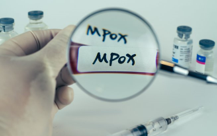
With the 2024 festive season looming, the Nelson Mandela Bay Municipality has urged residents to remain vigilant against the spread of mpox disease which broke out in South African earlier this year.
The metro said that on receiving the news about the outbreak, the municipality, working together with the Eastern Cape Department of Health and private health care facilities conducted investigations on suspected cases.
Clinical investigations confirmed that by October 2024, no mpox cases had been recorded in the metro.
“However, with the festive season looming and travelling expected to be at peak season, the metro urges residents to remain vigilant and present themselves for examination to their nearest health facility should they experience mpox related symptoms,” the municipality said.
Mpox is an infectious disease caused by the Monkeypox virus an enveloped double-stranded DNA virus of the Orthopoxviral genus.
Anyone can get mpox as it can spread through contact with infected people through touch, kissing, or sex or through contaminated needles, among others.
Pregnant people may also pass the virus on to their unborn baby.
“Although no cases have been recorded in the Bay area, as the city we believe knowledge is power. It is for this reason that we wish to urge our residents to remain vigilant and present themselves for examination to their nearest health facilities should they experience mpox related symptoms,” the municipality said.
In September, the Department of Health called for continued public vigilance as the country recorded another laboratory-confirmed mpox case.
This increased the total number of positive cases recorded in the country since the outbreak in May this year to 25 cases, including three deaths.
READ | SA records another mpox case
Mpox causes signs and symptoms
Mpox signs and symptoms usually begin within a week but can start between 1–21 days after exposure.
Symptoms typically last 2–4 weeks but may last longer in someone with a weakened immune system.
Common symptoms of mpox are rash, fever, sore throat, headache, muscle aches, back pain, low energy, swollen lymph nodes.
For some people, the first symptom of mpox is a rash, while others may have different symptoms first.
The rash begins as a flat sore which develops into a blister filled with liquid and may be itchy or painful. As the rash heals, the lesions dry up, crust over, and fall off.
Some people may have one or a few skin lesions and others have hundreds or more. These can appear anywhere on the body such as the palms of hands and soles of feet, face, mouth and throat, groin and genital areas and the anus.
Children, pregnant people, and people with weak immune systems are at risk for complications from mpox. Some people can be infected without developing any symptoms.
People with mpox can become very sick, for example, the skin can become infected with bacteria leading to abscesses or serious skin damage.
Other complications include pneumonia, corneal infection with loss of vision; pain or difficulty swallowing, vomiting and diarrhoea causing severe dehydration or malnutrition; sepsis (infection of the blood with a widespread inflammatory response in the body), inflammation of the brain (encephalitis), heart (myocarditis), rectum (proctitis), genital organs (balanitis) or urinary passages (urethritis), or death.
People with immune suppression due to medication or medical conditions are at higher risk of serious illness and death due to mpox.
Most people with mpox usually recover within 2–4 weeks.
Some things to do to help the symptoms and prevent infecting others:
- Stay home and in your own room if possible (isolation).
- Wash hands often with soap and water or hand sanitizer, especially before or after touching sores.
- Wear a mask and cover lesions when around other people until your rash heals.
- Keep skin dry and uncovered (unless in a room with someone else).
- Avoid touching items in shared spaces and disinfect shared spaces frequently.
- Use saltwater rinses for sores in the mouth.
- Take over-the-counter medications for pain.
- Hair clippers and similar contact equipment in salons to be thoroughly sterilised after each customer.
- Body piercing and tattooing equipment in tattoo parlours to be thoroughly sterilised after each customer. – SAnews.gov.za


